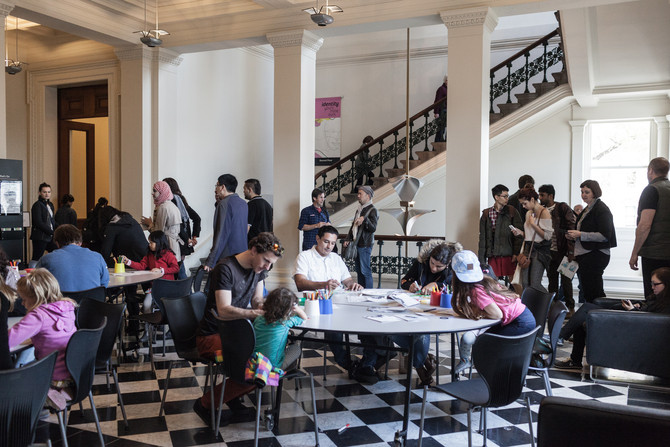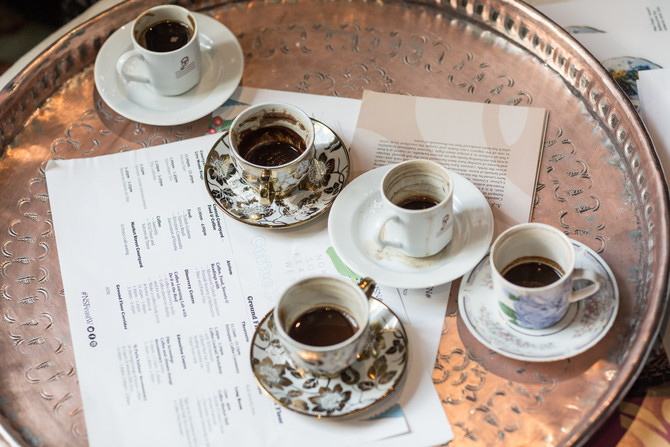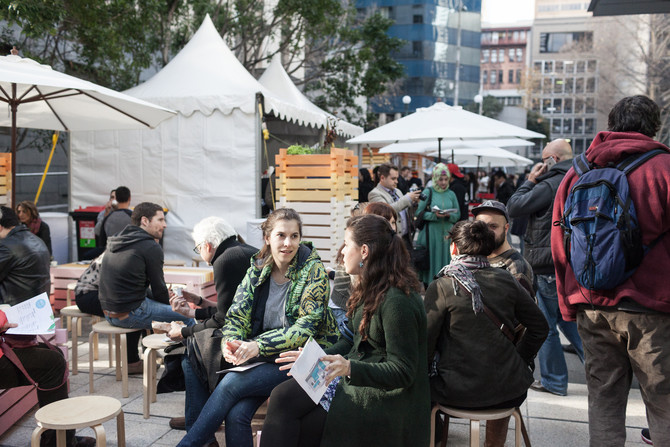
Visitors in the courtyard at Coffee Fest (part of the North South Feast West Festival) at Immigration Museum
Earlier this year, Melbourne’s Immigration Museum hosted Coffee Fest, the latest in its North South Feast West event series. North South Feast West—having previously hosted chili and chocolate-themed parties for the good people of Melbourne—aims to celebrate the contributions that various cultures and migrant groups have made to global cuisine in this international city.
Jo Daniell, Program Manager of Community Engagement at the Immigration Museum, called Coffee Fest a “community festival on all things coffee—from coffee tastings, ceremony and coffee readings according to Brazilian, Turkish, Ethiopian, Vietnamese, and Finnish traditions—to live music.” For the coffee lover who wants to mix their uppers and downers, there was a coffee cocktail-making workshop with Black Pearl’s Will Sleeman. And for those who love coffee so much that we want to rub it all over our bodies, there was a coffee scrub-making workshop by Frank Body.
The day opened with a traditional Ethiopian coffee ceremony. “The ceremony used live coffee brewing, acting, song, narration, and dance to show how coffee and ceremony is used in a range of ways to promote community and relationship reconciliations, mediation, and to resolve conflict,” said Daniell. The day’s events were coordinated by a multi-cultural planning committee.
The museum’s courtyard was transformed into a live music tent and dining area, featuring stalls slinging traditional cuisine from the countries featured at Coffee Fest. I opted for injera, lentils, and veggie curry from the Ethiopian Community Association of Victoria paired with Finnish coffee from the Finnish Society of Melbourne, although the options for international (and perhaps unusual) pairings were plentiful. In the background, the LALIbelas—an Ethio-jazz collaboration—played lively genre-bending uptempo tunes.
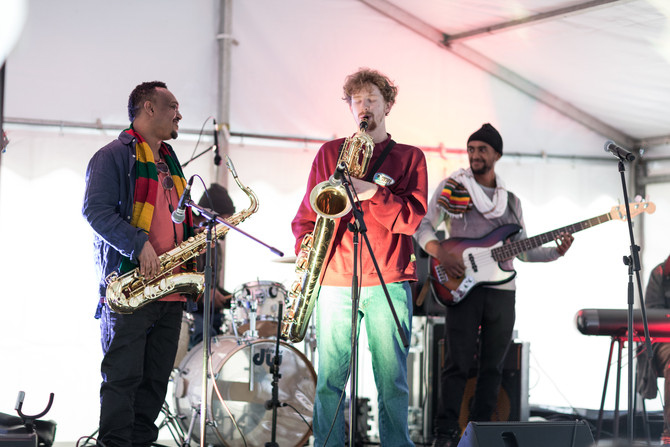
The LALIBELAS performing at Coffee Fest (part of the North South Feast West Festival) at Immigration Museum
I asked Riina Aapa, the Vice President of the Finnish Society of Melbourne, about the coffee they were pouring. She told me I was drinking the most popular coffee in Finland, Juhla-Mokka by Paulig. It was brewed in the traditional method:
“The traditional way to prepare the coffee is unfiltered, as we did yesterday: first you bring the water in the pot to the boil, then add the ground coffee. As soon as it ‘bubbles’, turn off the stove. You then let the grind settle to the bottom before pouring it. You check that the color is right by pouring some out and if not, let it sit a while longer before serving. (Only experience will tell you what the “right” color is!) The coffee pots used are stainless steel and come in different sizes.”
Paulig was started in 1876 by Finn Gustav Paulig, and has developed into a colossal operation. Small-scale and independent coffee it is not, but it is nostalgic for Finns in Melbourne who drink it via the Finnish Society, its sole local importer. Aapa told me that “the roast is very light, as that is what Finns are used to.” Finns, both Daniell and I were surprised to learn, are some of the biggest consumers of coffee in the world.
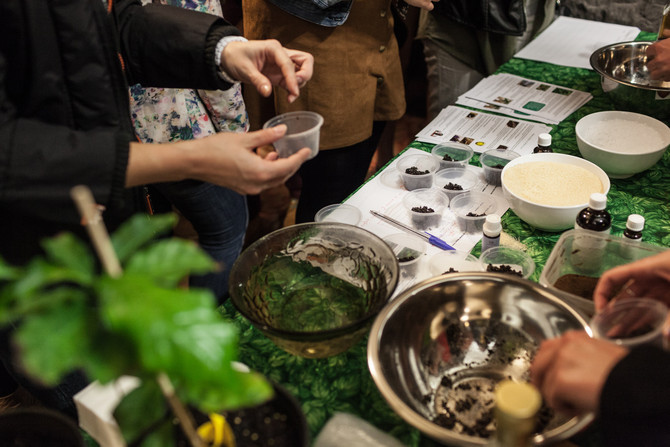
Coffee Learning Lab with do it on the Roof at Coffee Fest (part of the North South Feast West Festival) at Immigration Museum
In addition to eating and drinking, there were educational and cultural events throughout the museum. In the Coffee Learning Lab, curated by Do It On The Roof, there were coffee plants on display and for sale, with experts on hand to answer questions about home coffee gardening. They sold varieties chosen specifically for their ability to tolerate Melbourne’s complicated weather, including Coffee K7 and Catui Dwarf. There were also film screenings: a six-minute documentary on coffee and climate change and the longer feature documentary Lygon Street: Si Parla Italiano, a fascinating look into Melbourne’s Italian espresso beginnings.
Melburnians know that Lygon Street in the inner north suburb of Carlton is the city’s Italian hub. Si Parla Italiano showcased the Italian immigrants in and around the 1950s who were responsible for creating the espresso-loving culture still prevalent throughout Australia. I asked Daniell about the inclusion of the feature-length documentary in the festival: “The Italian influence is so important to Melbourne coffee culture, and Melbourne/Australian coffee histories, and the film really highlights and celebrates that. On the day, we saw many people choose to watch the entire film as part of their festival experience on the day.” To this day, only serious coffee connoisseurs make filter coffee at home; Melburnians overwhelmingly get their caffeine fix via one of the many espresso machines peppered around the city. This is one of the myriad ways Melbourne’s coffee scene is unique, and a lens focused on the important social history of this phenomenon was most welcome.
Specialty coffee is ubiquitous in Melbourne. As an immigrant and coffee lover, I was immediately struck by the realization that you can’t swing a cat without hitting a cafe that serves really good coffee in this city. For that reason, and because Melbourne is a culinary cultural hub, coffee culture here is always challenging itself and its consumers with new methods and marriages with other facets of culinary life. Coffee Fest was an exercise in thinking critically about coffee in different ways than specialty coffee lovers may be used to. At places like Aunty Peg’s (and many other cafes), specialty coffee farmers, roasters, and brewers are celebrated; milk frothing techniques are discussed and analyzed; and filter methods are toyed with. At Coffee Fest, the communities that partake in and shape Melbourne’s coffee culture were exalted, and the energy was purely celebratory. When I asked Daniell what she hoped Melburnians took away from the bustling Coffee Fest, she told me, “We hope that Coffee Fest visitors learnt something about the different roles coffee plays in cultures from around the world, and that everyone got to taste some great coffee and enjoy Coffee Fest’s music, film, and food delights!”
We’ll call that a win, then.
Phylisa Wisdom (@phylisajoy) is a freelance journalist based in Melbourne. Read more Phylisa Wisdom on Sprudge. Photos courtesy of the Immigration Museum Coffee Festival.
The post In Melbourne, Celebrating Immigration & Coffee In The Very Same Sip appeared first on Sprudge.


